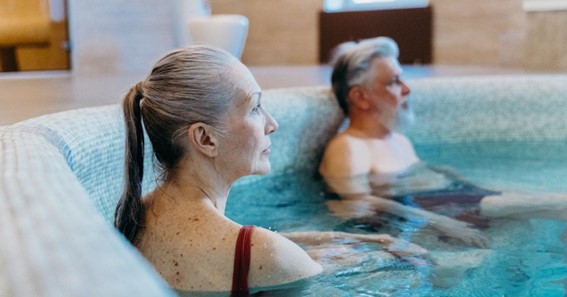Though situations will always vary between individuals, people living with dementia are generally advised to keep active, stay social and eat a healthy, balanced diet — among other advisories — as part of general advice on living well.
For those living with any type of dementia, finding a comfortable and safe way to stay active while also incorporating an element of social interaction can be a challenge. For many, swimming has answered this niche call. In recent years, an increasing number of community centres have added senior swim times, dementia-friendly swim times, and senior aqua aerobics to their weekly scheduling.
While enjoying a regular swim can help all of us as we age, swimming can help some seniors in early to mid-stage dementia in additional ways. Here are five benefits of swimming for those living with dementia.
1. Water Is Relaxing
While it’s safe to say that the sound, touch, and movement of water is relaxing for most people, this is especially true for some people living with dementia. For those living with the illness, swimming has been shown to ease some of the symptoms of dementia as it relaxes the mind, eases agitation, and quells feelings of anxiety.
2. It Allows Caregivers to Monitor Dementia Symptoms
One lesser-considered benefit of swimming for those living with dementia is that it allows caregivers — whether the caregiver is a family member or one of your local dementia care specialists — to monitor symptoms of dementia in a controlled, real-world environment and on a frequent basis.
3. Swimming Keeps the Body Strong
Swimming is a whole-body, low-impact workout. Activities like this are crucial for those living with dementia since regular exercise can:
- Help boost blood flow to the brain. Blood flow is essential as it allows the brain to absorb and process oxygen and nutrients; further, a boost in blood flow can help with memory.
- Bolster strength retention and flexibility in the joints and muscles, offering individuals independence for as long as possible.
- Improve coordination. This is especially important for people living with vascular dementia, where they may experience a loss of balance and movement.
- Increase appetite. A regular swim can help those with a suppressed appetite feel hungry. Regular, nutritious meals are key for those living with dementia as without a healthy appetite and diet, they can come down with temporary illness, like a cold, which can be confusing and distressing.
Click here – What Is Naming Word?
4. Swimming Can Help Us Gain a Better Night’s Sleep
For some people living with dementia, it can be a struggle to maintain a regular sleep pattern. Their body clock may be disturbed, making them feel drowsy during the day and have trouble sleeping at night.
An afternoon spent swimming at the pool (not to mention the activity that comes with getting to and from the centre) can help those with dementia maintain a better sleep schedule, allowing them to get a more thorough night’s sleep when the time comes. This is vital, as proper sleep can help people feel better mentally and less confused.
5. Swimming Can be Social
Loneliness and isolation can regrettably become the norm for some people living with dementia. This is a risky situation as symptoms may escalate, seeing the person losing their ability to communicate and gaining a heightened propensity for anti-social behaviours.
Regular swimming sessions can help keep these symptoms at bay for as long as possible. Frequent interaction with a core group of people can improve communication skills and boost feelings of happiness and reduce feelings of depression.
The Takeaway
Swimming offers those living with dementia a series of mental and physical benefits. If you’re caring for a loved one living with a type of the illness, why not see if your local community centre offers dementia-friendly swim times? It might be a way to keep them happier and healthier, and it might be a fun activity you can enjoy together.






